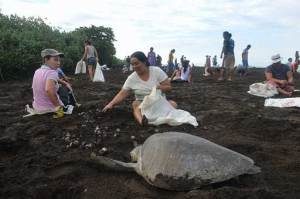
Collecting turtle eggs. Photo: Ostional National Wildlife Refuge
The Ostional National Wildlife Refuge on the Pacific coast of Costa Rica is well known for its turtle fisheries and allied turtle conservation efforts. Women and men are actively engaged in the fishery and protection activities, usually in different ways. This management analysis in Marine Policy (open access article) (“What makes them follow the rules? Empirical evidence from turtle egg harvesters in Costa Rica” by Roger Madrigal-Ballestero, Achim Schluter and Maria Claudia Lopez) contains very useful gender analyses of how the fishery and protection system work. It “presents an empirical analysis of the factors that determine individual compliance with a locally devised set of rules for harvesting and selling marine turtle eggs, as well as for protecting the turtles and their hatchlings. Individuals who violate the rules receive a monetary penalty, which implies a reduction in the income from sale of eggs. … Using written records of deductions due to sanctions between May 2008 and May 2010 and information from a survey of 108 local turtle egg harvesters, the paper presents the results of econometric analyses of factors that influence the amount of fines received by individuals. The results suggest that individual dependence on the income from sale of eggs, perceptions of rules and their legitimacy, and demographic factors such as age and gender are all important factors explaining rule breaking behavior….” In particular, women tend to comply better than men with the rules and take a longer view. Gendered divisions of labour are strong and women’s work is less well regarded in the community than that of the men.
This entry was posted in: Men, Women
